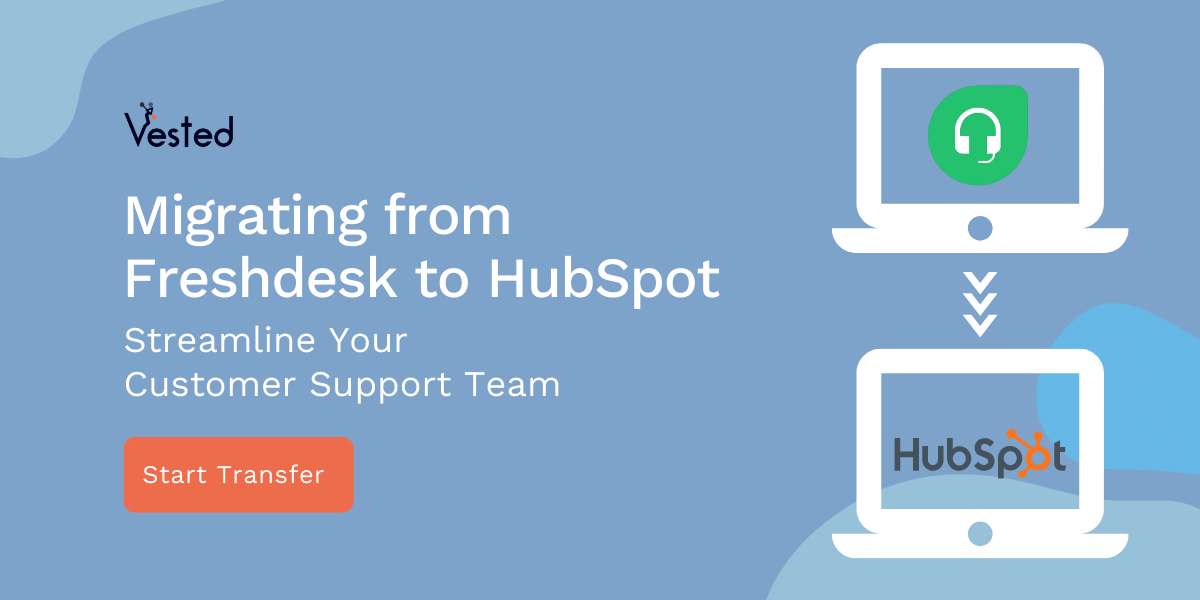How To Tell If Your HubSpot Portal Is Set Up Wrong
If your HubSpot portal feels hard to trust, hard to scale, or harder than it should be to use, it is likely set up incorrectly. Most HubSpot...

4 min read
![]() Vested Marketing
:
Updated on August 27, 2025
Vested Marketing
:
Updated on August 27, 2025
Table of Contents
The world of customer service software is crowded, loud, and (let’s be honest) a little overwhelming. If you’ve ever Googled “best help desk tools for small business” and found yourself drowning in endless comparison charts, you’re not alone.
The truth is, not every tool is built for every business. What works for an e-commerce startup might be a nightmare for a scaling SaaS team. This guide is a no-fluff framework to help you sort through the noise, understand what matters most, and make a confident decision you won’t regret six months from now.
Customer service software is the set of digital tools businesses use to manage, organize, and improve the way they support customers. At its core, it gives teams a central hub to track conversations, respond quickly, and resolve issues across channels like email, live chat, phone, and social media.
But it’s more than just a “help desk.” Modern platforms go beyond ticketing - they unify customer interactions, automate repetitive tasks, surface insights through reporting, and even integrate with sales and marketing systems.
The best ones also layer in AI customer support tools to speed up responses and improve personalization without adding more headcount.
Before you start demoing tools or comparing feature lists, pause and ask: Where is my team right now?
Just starting out – You’re setting up your first structured support system and need something simple, affordable, and easy to adopt.
Growing quickly – Ticket volume is climbing, your team is expanding, and you need a tool that scales with you without breaking workflows.
Needing more unification – Marketing, sales, and service are siloed, and leadership is pushing for a unified system with deeper insights.
Being honest about your stage helps narrow the field fast.
Not all features are mission-critical. One of the biggest mistakes teams make is paying for “nice-to-haves” while overlooking the essentials. We recommend using the 3-Bucket Method:
Can customers reach you where they already are? (email, chat, phone, social)
How quickly can tickets be routed to the right agent?
Does it offer automation for repetitive tasks?
Can the tool support multiple agents without chaos?
Does it integrate with your CRM for cross-team alignment?
Will reporting help you spot churn risks or upsell opportunities?
AI chatbots or AI customer support tools for instant replies
Multilingual support for global customers
Knowledge base builders for self-service
Take this list to your next team meeting and get clear on what truly matters.
Here’s the plain-English version you’ve been looking for.
Built specifically for e-commerce, Gorgias integrates tightly with platforms like Shopify to streamline online store support. It’s designed to handle high volumes of repetitive customer requests quickly and efficiently.
Best For: E-commerce shops
Strengths: Shopify integration, macros
Why Teams Like It: Super fast for handling repetitive e-com tickets
One of the most established names in customer service software, Zendesk is known for its scalability and deep customization. It’s powerful for large teams, but can feel heavy for smaller businesses.
Best For: Large, complex teams
Strengths: Scalable ticketing, deep customization
Why Teams Like It: Known for being robust (sometimes too robust for small teams)
Intercom focuses on conversational support, with in-app messaging and customer engagement at its core. It’s especially popular with SaaS companies that want proactive, real-time communication.
Best For: SaaS companies
Strengths: In-app messaging, customer engagement
Why Teams Like It: Great for proactive support & user onboarding
As part of HubSpot’s all-in-one CRM, Service Hub connects support with sales and marketing for a unified customer experience. It balances ease of use with automation and powerful reporting.
Best For: Growing businesses needing unification
Strengths: All-in-one with sales/marketing alignment, automation
Why Teams Like It: A favorite for teams wanting CRM + service under one roof
Freshdesk offers straightforward, budget-friendly ticketing that’s easy to set up. It’s a great option for smaller teams that need reliable help desk software without the complexity.
Best For: Small to mid-size businesses
Strengths: Affordable, simple ticketing
Why Teams Like It: Easy to set up, budget-friendly option
This isn’t about picking the “flashiest.” It’s about choosing the tool that matches your stage, goals, and workflows.

Too many teams treat reporting as an afterthought, but support data can transform retention, upsells, and overall customer success.
Basic reporting: Number of tickets closed, response time averages.
Advanced reporting: Customer satisfaction trends, churn risk signals, cross-sell opportunities, team performance insights.
Tools like HubSpot Service Hub stand out because they tie support data directly to sales and marketing activity, giving leaders a full-funnel view.
Switching platforms every year is exhausting (and expensive). Ask yourself:
Will this tool still serve us in 2–3 years?
How well does it integrate with our existing stack?
Can it handle automation and customer support at scale?
Does it give us room to grow into AI customer support tools without starting over?
The goal is to avoid outgrowing your software too quickly, or worse, locking into a tool that slows you down.
The right customer service platform won’t fix broken processes, but it can transform how your team works - bringing structure, speed, and clarity so you can focus on customers instead of tools.
Whether you’re comparing Gorgias, Zendesk, HubSpot, or other help desk tools, the goal is the same: choose the platform that improves your customer experience today while preparing you for tomorrow.
it’s not just retail or software companies that benefit - aviation/fbo providers, industrial firms, and even recycling operations all rely on customer service software to unify communication, streamline requests, and strengthen client relationships.
No matter the industry, the need for better customer experiences is universal.
Click below to book a strategy session with Vested and let’s find the best fit for your team!
![]() As a certified HubSpot Partner Agency, we not only understand the benefits of using the inbound marketing platform to increase traffic and engagement, improve SEO, generate leads, design effective websites and boost sales, we know how to make it happen.
As a certified HubSpot Partner Agency, we not only understand the benefits of using the inbound marketing platform to increase traffic and engagement, improve SEO, generate leads, design effective websites and boost sales, we know how to make it happen.
We are inbound marketing experts, SEO gurus and top-notch website developers.
Our team of Engineers Turned Marketers can help get you noticed - for a more innovative and effective way to reach customers, or provide a more seamless way for companies to find your services. Inbound Marketing has no limit to industry, serving from Crypto & NFT, mining, oil and gas, technology & automation, engineering, technology, construction, healthcare, specialty pharmacy, to industrial & manufacturing.

If your HubSpot portal feels hard to trust, hard to scale, or harder than it should be to use, it is likely set up incorrectly. Most HubSpot...

When one company encountered challenges scaling their customer service operations, they knew that updating their existing software was the right move...

Looking to bring in better leads, boost traffic, and actually turn visitors into customers? You don’t just need content, you need a strategy (and a...